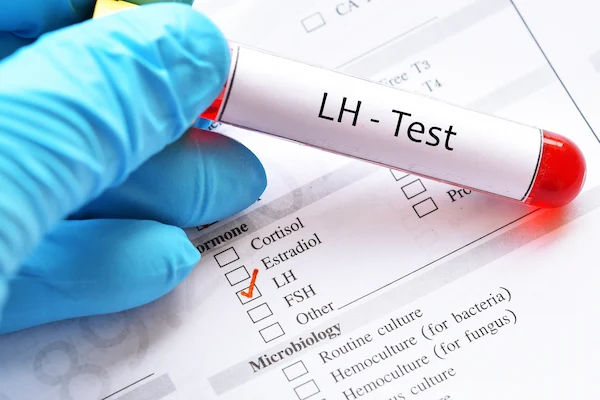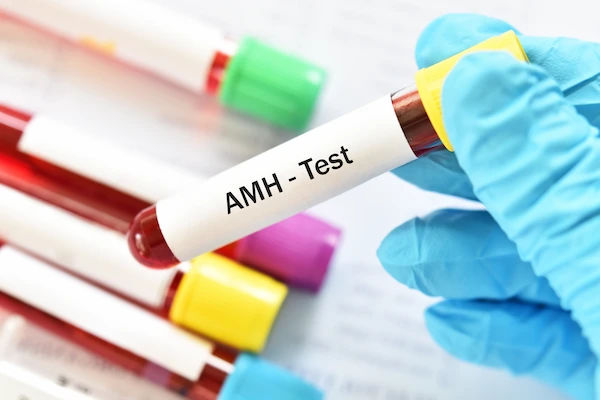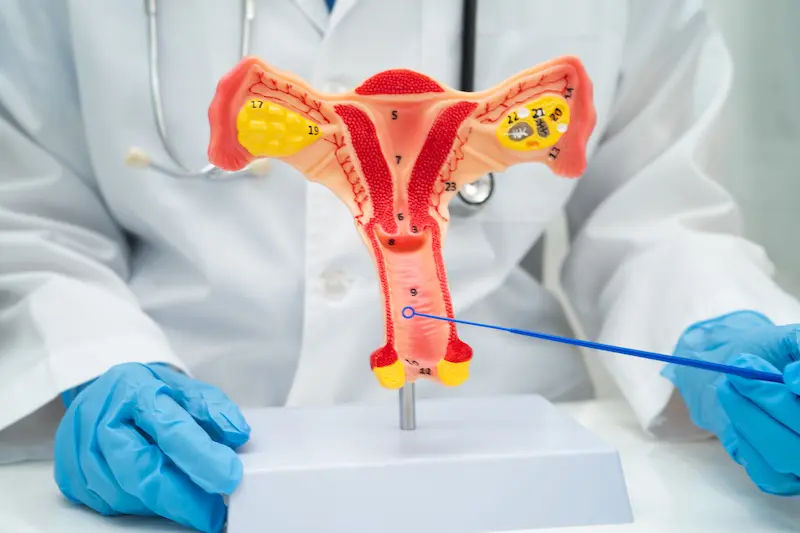What Is the AMH Test and Why Is It Crucial for Women Over 30?
The AMH test helps women over 30 understand their ovarian reserve and fertility timeline. Learn what the Anti-Müllerian Hormone test measures, why it matters, and when to consider it.

Written by Dr. Rohinipriyanka Pondugula
Reviewed by Dr. J T Hema Pratima MBBS, Fellowship in Diabetes Mellitus
Last updated on 9th Sep, 2025

If you are a woman in your 30s who is thinking about pregnancy now or in the future, your doctor may recommend an Anti-Müllerian Hormone (AMH) test. This simple blood test is used to estimate your ovarian reserve, which refers to the number of eggs you have remaining. After age 30, a woman’s egg supply naturally begins to decline, and the AMH test can help assess how much time you might have to conceive. While many factors can influence fertility, knowing your ovarian reserve can offer valuable insights into your reproductive health and help guide decisions about timing, lifestyle, or fertility treatments.
By understanding these levels early, you can make more informed choices about your options and work closely with your doctor to plan ahead. Whether you're ready to try now or are considering egg freezing or future fertility support, the AMH test can be an important step in your journey. This article will guide you through what the AMH test measures, why it matters for women over 30, and how it can support your fertility planning.
Understanding the AMH Test: A Guide to Ovarian Reserve
The Anti-Müllerian Hormone (AMH) test is a blood test used to estimate a woman’s ovarian reserve, which refers to the number of eggs remaining in the ovaries. AMH is produced by small, developing follicles (called antral follicles) in the ovaries that contain immature eggs. The level of AMH in the blood reflects how many of these follicles are present.
How the AMH Test Works
- Estimate egg quantity: Higher AMH levels suggest a greater number of remaining eggs, while lower levels indicate a reduced egg supply.
- Does not assess egg quality: AMH levels do not reflect whether the eggs are healthy or capable of fertilisation. Egg quality is mostly influenced by age.
- Stable throughout the menstrual cycle: Unlike other reproductive hormones such as FSH (Follicle-Stimulating Hormone) or LH (Luteinizing Hormone), AMH levels remain relatively constant. This means the test can be done on any day of the cycle.
Why the AMH Test Is Important for Women Over 30
Women are born with a fixed number of eggs, and this number naturally declines with age. Fertility begins to decrease in the early 30s and drops more sharply after age 35. The AMH test provides a personalised estimate of how many eggs remain, which can help with:
- Understanding your fertility timeline: Knowing your AMH level can help estimate how much time you may have to conceive naturally.
- Planning for pregnancy: It can guide decisions about when to try for pregnancy or whether to consider options like egg freezing.
- Fertility treatment planning: For women undergoing assisted reproductive treatments such as IVF (In Vitro Fertilisation), AMH levels help predict how the ovaries may respond to stimulation.
While the AMH test is not a complete measure of fertility, it is a useful tool for understanding reproductive potential and making informed decisions about family planning. Let me know if you'd like help interpreting AMH levels or comparing them by age.
Get Your Fertility Potential Assessed
When to Consider an AMH Test
Doctors often recommend an Anti-Müllerian Hormone (AMH) test to better understand a woman's fertility potential, particularly after age 30 when ovarian reserve naturally begins to decline. You may consider an AMH test if you:
- Are planning to get pregnant soon and want a clearer picture of your current egg reserve.
- Have been trying to conceive for 6 to 12 months without success, to help evaluate possible causes of infertility.
- Are exploring fertility treatments like IVF or ovulation induction, since AMH helps predict how your ovaries might respond to medications.
- Have a family history of early menopause, which may signal a higher risk of declining ovarian reserve.
- Have had ovarian surgery, chemotherapy, or radiation, as these can reduce the number of healthy eggs.
- Are considering egg freezing and want to estimate how many eggs might be retrieved in a cycle.
- Have been diagnosed with or show signs of PCOS (Polycystic Ovary Syndrome), which is often associated with elevated AMH levels due to a higher number of small follicles.
This test offers valuable insight into your reproductive timeline and supports more informed decisions about family planning or fertility preservation.
Key Aspects of the AMH Test: Procedure, Preparation, and Interpretation
Understanding the practical details of the AMH test can help you feel more prepared and confident.
1. Procedure: A Simple Blood Draw
- The AMH test is a routine blood test. A healthcare professional will draw a small sample of blood, usually from a vein in your arm. The process is quick and generally takes only a few minutes.
2. Preparation: No Special Requirements
- One of the advantages of the AMH test is that you do not need to fast or make any special dietary changes before the test. It can be done at any time of day and at any point in your menstrual cycle, making it very convenient.
3. Interpreting Your Results: What Do the Numbers Mean?
- Your AMH result is typically given in nanograms per millilitre (ng/mL) or picomoles per litre (pmol/L). Your doctor will interpret this number in the context of your age, medical history, and overall fertility goals.
High AMH Levels (e.g., >3.0 ng/mL):
- Often indicates a good ovarian reserve.
- It can also be seen in women with Polycystic Ovary Syndrome (PCOS), as they tend to have a higher number of small follicles.
Normal/Adequate AMH Levels (e.g., 1.0 - 3.0 ng/mL):
- Suggests a healthy ovarian reserve for your age.
- Considered a good indicator for natural conception and response to fertility treatments.
Low AMH Levels (e.g., <1.0 ng/mL):
- Indicates a diminished ovarian reserve, meaning a lower number of eggs remaining.
- Suggests a potentially shorter reproductive window.
- Does not mean you cannot get pregnant naturally, but it might indicate a need for more urgent action or consideration of fertility treatments.
Very Low AMH Levels (e.g., <0.5 ng/mL):
- Suggests a severely diminished ovarian reserve.
- While conception is still possible, it may be more challenging, and fertility treatment options might be limited.
Important Note: AMH results should always be interpreted by a healthcare professional specialising in fertility or reproductive endocrinology. They will combine your AMH level with other factors like your age, FSH levels, and antral follicle count (from an ultrasound) to provide a complete assessment of your fertility potential.
The results from your AMH test, combined with your medical history and fertility goals, will help your doctor accurately assess your ovarian reserve and guide discussions about optimal timing for conception or potential fertility treatments. This detailed understanding empowers you to make informed decisions about your reproductive future.
Get Tested Easily with Apollo 24|7
If your doctor recommends an AMH test to assess your ovarian reserve, choosing a reliable and convenient testing service is important. Apollo 24|7 makes this simple by providing accurate lab tests with quick results. This helps you and your doctor understand your fertility potential clearly and create a personalised plan for your reproductive journey.
Why Choose Apollo 24|7 for Your Fertility Health Checkups?
- Comprehensive Test Panels: Access the Anti-Müllerian Hormone (AMH) test directly, often included in broader Fertility Test Panels or Female Health Checkup options for a more comprehensive assessment.
- NABL-Accredited Labs: Tests are done in labs certified by the National Accreditation Board for Testing and Calibration Laboratories (NABL), ensuring accurate and trustworthy results.
- Home Sample Collection: Enjoy the convenience of blood sample collection at your home, saving you time and providing privacy.
- Easy Online Booking: Schedule your test quickly and easily through the Apollo 24|7 app or website.
- Fast Digital Reports: Receive secure, detailed test reports online promptly, ready to share with your doctor.
- Trusted Brand: Benefit from the trusted expertise and healthcare legacy of Apollo Hospitals Group, one of India’s most respected medical networks.
By choosing Apollo 24|7, you get access to dependable, convenient diagnostic services that make it easier to understand and manage your reproductive health effectively.
For the most accurate and current pricing for relevant tests, it is best to check the Apollo 24|7 website, use their mobile app, or contact their customer support team directly. Pricing may vary based on your location, available offers, or membership benefits.
Conclusion
For women over 30 planning pregnancy, the Anti-Müllerian Hormone (AMH) test is a crucial tool. It offers invaluable insights into your ovarian reserve, helping to estimate your remaining egg supply and providing a clearer picture of your reproductive timeline.
Understanding what the AMH test measures, how to prepare, and what your results mean empowers you to engage in informed discussions with your doctor. This test helps guide decisions about optimal timing for conception, explore fertility treatment options if needed, and ultimately, build a more confident path toward your family planning goals. If you're a woman over 30 considering pregnancy, consult your doctor to discuss whether an AMH test can provide the answers you need.


.webp)


